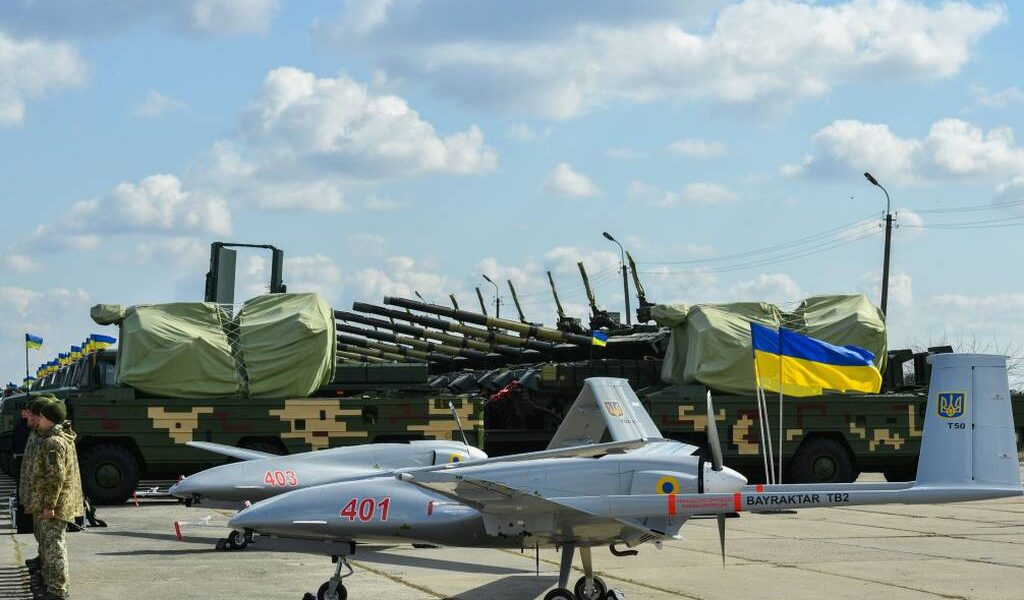With Kyiv’s refusal to implement the Minsk agreement, coupled with threats of restarting a nuclear program from a production facility in the city of Dnipro, Russia lost patience with protracted negotiations that did not lead to a resolution on Ukraine’s NATO membership or resolve the situation in Donbass after eight years.
Moscow then took the drastic step of pre-emptively striking Ukraine’s military capabilities to ensure the security of Russia and Donbass. Such an action could open the way for Turkey to reconcile with Washington after estrangement following Joe Biden’s ascendency to the White House.
Russian strikes reportedly destroyed Ukraine’s fleet of Bayraktar drones, something that will surely anger the Turkish military industrial complex and war hawks in Ankara.
As recently as February 3, Ankara and Kyiv agreed to coproduce the Turkish-made drone at a production site in Ukraine. Ukrainian Defense Minister Olesii Reznikov told reporters in Kyiv at the time that the coproduction compound would also include a training center where Ukrainian pilots would be trained. This agreement comes as in September last year, the Ukrainian government announced that it was planning to buy 24 more Turkish drones.
Reznikov said that the coproduced drones would be dubbed the Turkish-Ukrainian Bayraktar. However, it appears that hopes for the Turkish-Ukrainian Bayraktar were dashed even before they could be mass produced as Russian forces allegedly destroyed the production facility in Ukraine.
It is recalled that the distribution of Bayraktar drones to Russia’s borders were welcomed by the US and it was naively expected that it would be a gamechanger or tip the balance of power.
In one instance, Senior Hudson Institution fellow Michael Doran audaciously tweeted in May 2021 that: “Turkish drones are slowly beginning to surround Russia. Ukraine and Poland to the west, Turkey and Azerbaijan to the south and possibly Kazakhstan to the east. That’s how you contain Russia.”
The prevailing idea was that because of the success of Bayraktar drones against impoverished militias from Ethiopia or a country like Armenia, whose population is four times smaller then Moscow's alone, it would be replicated against the Russian military, which is ranked second out of the 140 countries considered in the annual Global Fire Power review. Russia achieved a “perfect score” of 0.0000 according to their 2022 index.
According to Dr Spyros Plakoudas, a professor on security studies at Rabdan Academy, Turkish-Ukrainian drones “were destroyed on the ground most likely. The Russian military forces targeted not only the bases of the Bayraktar but also the factory of Motor Sich (supplier of the engines for Bayraktar and Akinji UAVs).”
They were destroyed on the ground most likely.
The Russian military forces targeted not only the bases of the Bayraktar but also the factory of Motor Sich (supplier of the engines for Bayraktar and Akinji UAVs), according to the map below#BayraktarTb2 pic.twitter.com/LaU7YYuSiL
— Dr Spyros Plakoudas (@PlakoudasSpyros) February 24, 2022
Effectively the Russian military destroyed in a single night the Turkish-Ukrainian coproduction that was many years in the making. For now, it is likely that Ankara will remain silent on the destruction of its coproduction with Ukraine, including the drones, as the Bayraktar failure to defend Ukraine damages the reputation of Turkey’s military industrial complex. It is reminded that this author received a seize and desist order or face a Turkish court for just merely publishing images of destroyed Turkish drones in Libya.
None-the-less, Ukraine is still pinning its hopes on Turkey to reverse Russia’s operation. Ukraine’s Ambassador to Ankara Vasyl Bodnar personally relayed to the Turkish Foreign Ministry the request to close “the Dardanelles and Bosporus for Russian ships.”
According to the 1936 Montreux Convention, Turkey has control of the Dardanelles and Bosporus straits leading from the Mediterranean to the Black Sea. The Montreux Convention allows Black Sea states unlimited access to the Black Sea but imposes strict limitations on naval vessels from other states. Restricting Russian warships will inevitably lead to a major crisis as Moscow will certainly not tolerate being locked in the Black Sea and its Mediterranean fleet being isolated.
Turkish President Recep Tayyip Erdoğan hypocritically described Russia’s operation “contrary to international law” and a “heavy blow to the peace, tranquillity and stability of the region.” Ankara justifies its occupation of northern Cyprus and Syria for lesser pretexts, and it could be assumed that if Greece or Syria were to state its goal of acquiring nuclear weapons, Turkey’s response would be just as proportionate as Moscow’s.
Given Turkey’s isolation from the West, Ankara could use the war in Ukraine as an opportunity to reconcile with the US. The Turkish economy is under huge strain, something that has plummeted Erdoğan’s popularity, and although Turkey is unlikely to close the Straits to Russian ships, using this as a threat could be the first step in reconciliation with Washington.
It is not forgotten that Ankara continues to make fake allegations of Russia’s persecution of Crimean Tartars, and over the course of the war, we could see Turkey advocating for Turkic Tartars in Ukraine as another way to pressure Moscow. Although Turkey has fostered areas of close cooperation with Russia, such as building nuclear plants and the S-400 deal, Moscow and Ankara are not strategic allies. However, Ukraine and Turkey certainly are strategic allies, and if Ankara is given an opportunity to reconcile with the West by strongly supporting Kyiv against Moscow, then it may certainly take it.
READ MORE: Ukrainian soldiers last words on Snake Island: “Russian warship, go f**k yourself.”


